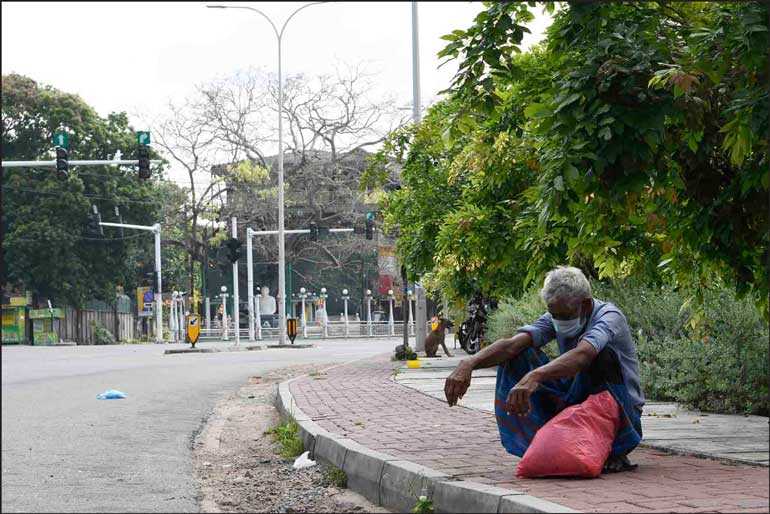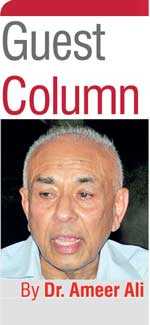Monday Feb 23, 2026
Monday Feb 23, 2026
Saturday, 28 March 2020 00:02 - - {{hitsCtrl.values.hits}}

An impending global recession if not depression is becoming a reality by the day – Pic by Shehan Gunasekara
 The social dislocation, economic disruption and financial losses pushing towards an inevitable recession if not depression, and the health crisis are the combined effects of a totally unexpected pandemic caused by COVID-19.
The social dislocation, economic disruption and financial losses pushing towards an inevitable recession if not depression, and the health crisis are the combined effects of a totally unexpected pandemic caused by COVID-19.
More than the severity of the infection, it is the speed of its spread that is causing panic and despair among world leaders. Infection is growing exponentially, and the virus, like global warming and other natural calamities is again compelling humanity to think as one family and act together to seek remedies.
Nature, unlike humans and its institutions, does not discriminate between the rich and poor, old and young, men and women, elite and the masses, and so on. In short, if there is one golden lesson that coronavirus is teaching us, it is in the field of economics, and in that discipline, it is particularly forcing the so-called civilised world, to reconsider its growth path, which is proving to be crooked and suicidal.
I have already opened this discussion in an earlier piece, but I want to go a bit deeper into it now. Modern economies, at least since the onset of the highly acclaimed but now debunked phenomenon of globalisation, are built primarily on three pillars namely, markets, capital and technology.
The last of the three has almost replaced labour, which until then not only played a crucial role in promoting economic growth, but also counterbalanced and controlled the rapaciousness of capital. But the driving force behind the combined operation of all three pillars is human greed, which is an embedded evil in human soul.
Greed looks at material life as a zero-sum game. It is this realisation that prompted saints and savants and prophets and philosophers of past and present, to teach and preach moral and ethical values at least to mellow the ferocity of injustice that greed can generate in human conditions.
None of the world religions, including Calvinist Protestantism that has the closest link with capitalism, according to Weber, did encourage greed to dictate material living. That situation changed radically with the collapse of Keynesian economics in the capitalist, and Marxian economics in the Communist world. These two branches of the same discipline constructed their economic designs to prevent greed running riot.
The 1980s marked the beginning of a new and tragic era in the economic life of humanity. A new breed of economists called monetarists and supply siders began tutoring captains of major political power centres of the world that unbridled markets in the hands of Schumpeterian entrepreneurs, aided by more and better technology would ultimately bring humanity to the Valhalla.
With technology going through a new and cataclysmic wave of macro and micro inventions, free markets and capital integrated economies on an unprecedented scale and humanity entered the era of globalisation. It was fashionably called a New Economic Order. In this NEO, old constraints on markets and capital favoured in different degrees by Keynesians, Marxists and socialist thinkers were considered primitive and thrown out of the window, and greed under the guise of entrepreneurship took centre stage in economic activities.
Economic growth at any cost became the hallmark of government policy making, and that growth was measured in terms of the almighty US dollar, which quantified the value of anything that went through the market and fetched a price. The global economic machine was oiled not by production of goods and services but by finances structured on baseless derivatives.
For the last 40 years or so the world was almost universally infected with the virus of greed and greed induced economic growth. The human victims of this new virus ran into millions if not billions, depending on who did the counting and how. And to take care of those victims, even charity was privatised. In any case, private philanthropy could not keep pace with systemic poverty.
The agony and anger of human victims were managed from time to time partly by throwing a few crumbs from masters’ tables, and partly through smooth talking and empty promises by hired preachers. All religions have historically been hired by ruling orders to participate in this camouflage by promising heavenly rewards to the meek and the poor in return for putting up with sufferings in this world.
However, there is one victim that refuses to put up with this dollar-managed drama and greed propelled growth, and that victim is the environment. For several decades, at least from late 1960s, scientists were warning world leaders that the type of economic growth being pursued was environmentally unsustainable.
The response to that warning was callous and put too much hope on technology. When the issue of global warming was gathering momentum from the beginning of this century, once again the rich countries led by the US ignored the clamour and went on doing business as usual. COVID-19 is the latest of environment’s weapons to fight against the ruling NEO.
COVID-19 is a virus that lay buried in nature for millennia until modern man with his reckless economic behaviour brought it to the open. That virus is now fighting against the human virus of economic growth. In this fight, the latter is collapsing like a pack of cards. Economies that were built on the edifice of free markets, capital and technology, and oiled by unproductive and fictitious finances are running for cover to save themselves.
An impending global recession if not depression is becoming a reality by the day. Trillions of dollars from nowhere are hurriedly being poured into the economy by governments to resuscitate struggling industries, reactivate small businesses that had gone into hibernation, and soften sufferings of families.
Yet, like previous recessions and depressions, there is always a silver line at the end of dark clouds, and light at the end of the tunnel. When that point is reached, nations cannot afford to go back to the old model that brought the disaster. The planet does not belong only to humans, but they have a responsibility to manage the planet, because humans are the best of creations.
Nature should be managed and not conquered, as taught to children in our schools. Nature is a partner and not an enemy of civilisation. Previous civilisations understood this partnership and designed their material life without wantonly destroying nature. Civilisations prospered and nature continued to remain resourceful and fertile while rewarding those civilisations with prosperity and happiness. In contrast, modern civilisation is qualitatively different and destructively callous towards the environment. The type of economic growth under robotic capitalism is not sustainable.
For instance, why spend precious resources on nuclear and biological warfare in the name of security and economic growth when peoples’ basic needs remain unsatisfied? Is it not criminal to destroy surplus food products to keep the market price profitable for corporations, when hundreds of millions of children and adults starve?
Why do the so-called super powers go and bomb other countries, plunder their resources, impoverish the people, make them homeless and migratory, create the terrorists and then blame terrorism for the initial bombing? Because, in all this there is profit to be made, and that profit increase the all-important GDP and economic growth. These are some of the blatant injustices perpetrated by free market capitalism.
Let those secretive institutions such as the IMF, WB and WTO, headed by a team of unelected leaders, who are sumptuously rewarded by corporate conglomerates for promoting this self-destructive growth model, learn the economic lesson from COVID-19 and revise their policies. There need to be a U-turn from greed driven economic growth. Otherwise, the next attack from the environment would be even more deadly.
(The writer is attached to the School of Business and Governance, Murdoch University, Western Australia.)